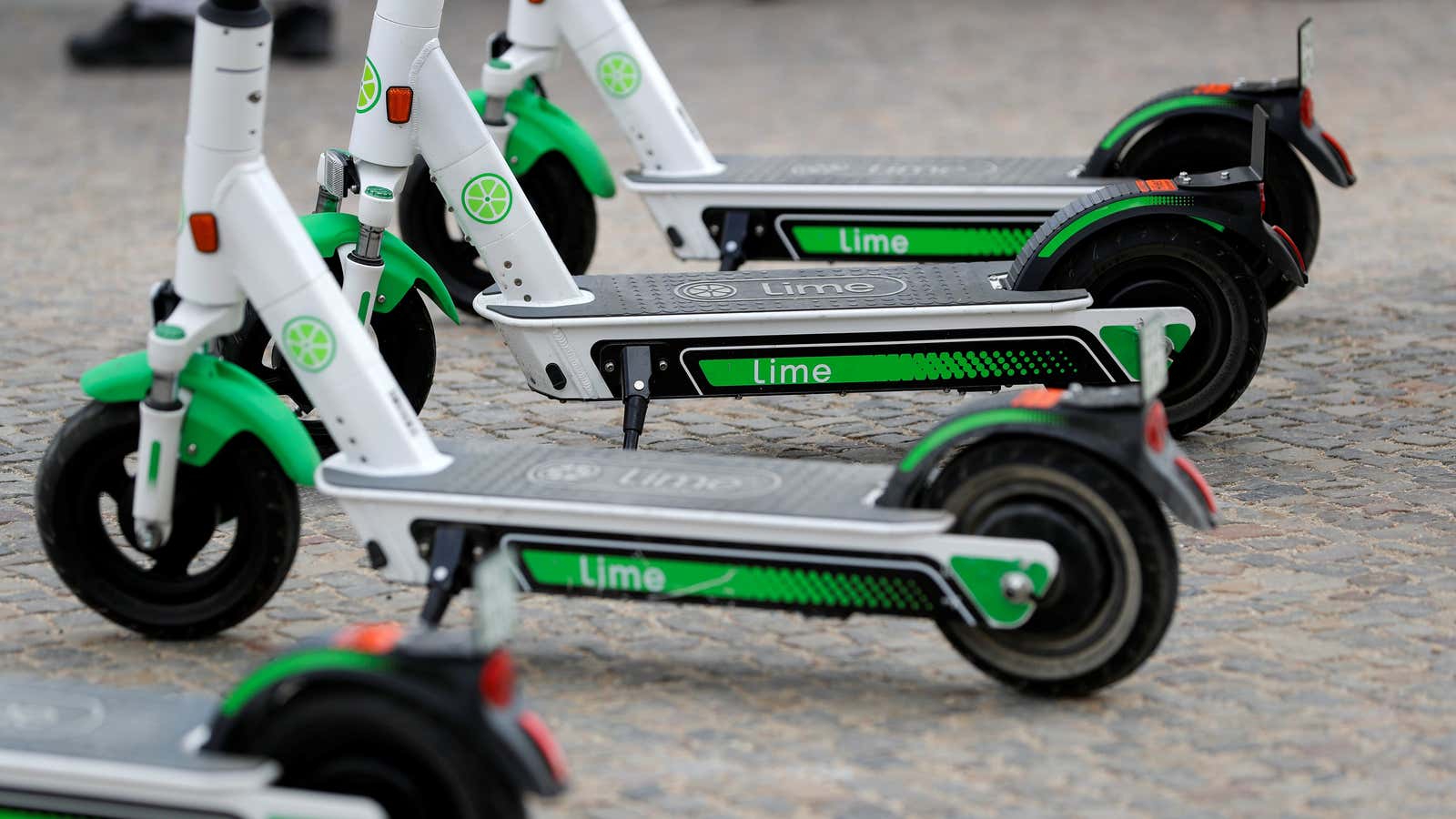Eric Amis, Jr. hopped on a Lime electric scooter for the last leg of his commute around midnight on May 16. The 20-year-old was headed home from his hotel job in Atlanta, Georgia. He had just pulled out of the local metro station parking lot when he was struck and killed by a Cadillac SUV. The driver later told investigators she wasn’t able to avoid him.
Amis was one of four people to die while riding an e-scooter in metro Atlanta last year. Each victim died after a collision with a motor vehicle—a car, a truck, and in one case, a county bus. It’s unclear if any of the riders was wearing a helmet. By Quartz’s count, more people have died on e-scooters in Atlanta than in any other city worldwide.
At least 29 people have died in e-scooter accidents since companies like Bird and Lime popularized rentable shared scooters in 2018, according to a Quartz analysis of global media reports. Most of the victims were male and were riding the scooter, though a handful of pedestrians have also died after being hit by scooters. Rider fatalities overwhelmingly involved a collision with a motor vehicle.
Twenty-nine deaths isn’t many, relatively speaking. In 2018, there were more than 36,000 motor vehicle fatalities in the US, according to the National Highway Traffic Safety Administration. That included more than 6,000 pedestrians and 857 cyclists. In 2019, there were 29 cyclist deaths in New York City alone.
Ride-hail company Uber wrote the growth-oriented playbook that scooter companies like Bird and Lime used in their early days: Launch first and ask permission later. Sometimes neither the city nor the company were ready. Lime in 2018 was forced to repeatedly pull scooters from service, first after discovering batteries in some were liable to catch fire, and then again after identifying a manufacturing defect that could cause scooter baseboards to suddenly break apart while in use.
A new and unregulated industry
Scooter companies maintain safety is their top priority. Over the past year, as investors soured on cash-burning companies, many scooter companies also shifted their focus from growth to building sturdier hardware and sustainable operations. This focus on safety and responsible growth has become all the more important as cities look to regulate the nascent micromobility industry.
“The key thing is safe infrastructure,” said Harry Porter, a spokesman for Santa Monica-based Bird. “I think the best thing we can do is make sure that infrastructure in cities is created in a way that means the Bird users or cyclists or pedestrians are segregated from the big metal boxes that drive around.”
Deaths of e-scooter riders have been met with both calls for safer streets and demands to take scooters off the road. Some companies recommend riders wear helmets—and require them for minors—but in practice many riders go without. Atlanta banned new scooter permits after its second scooter death, and set a nighttime curfew for riders after the fourth. The city says it hasn’t had a scooter fatality since, but several operators—Gotcha, Lyft, Lime, and most recently Bolt—have also fled under stricter regulations. Bird and Uber-owned Jump are among those still renting scooters in Atlanta.
Because the e-scooters industry is relatively new and unregulated, there aren’t good systems in place for tracking incidents related to them. The data Quartz collected on scooter deaths is almost certainly incomplete, but we couldn’t find a better count.
The best estimates come from a handful of studies, like a recent report in JAMA: The Journal of the American Medical Association that observed a “dramatic increase” in injuries and hospitalizations associated with e-scooter use in the US from 2017 to 2018. A joint study from Austin Public Health and the US Centers for Disease Control and Prevention last May estimated 20 rider injuries per 100,000 trips.
Companies can also resist sharing data, something cities have increasingly sought in exchange for operating permits and to help inform planning decisions, such as where to build new bikes lanes and parking corrals. This general tension around data-sharing makes tracking sensitive information on deaths and injuries even more difficult.
Traffic school for scooter riders
Lime, a San Francisco-based scooter company, for instance, contested Quartz’s tally that its devices were involved in more reported scooter deaths—11 of the 29 we found—than those of any other firm. (Nine of the reported deaths didn’t identify the type of scooter involved.) Lime said Quartz’s count of deaths linked to Lime scooters was “very close” but declined to provide its own figure. “You have no idea how many fatalities the other companies have had,” Nick Shapiro, Lime’s global head of trust and safety, said in an interview. “If it didn’t make press you wouldn’t know about it.”
Stockholm-based Voi, a scooter company founded in August 2018, recorded its first and so far only fatality in May 2019 when a 27-year-old man crashed into a car in Helsingborg, Sweden. Voi spokeswoman Kristina Nilsson said the company believes any accident is one too many. Voi operates an online “traffic school” that lets users take quizzes on subjects like parking, traffic rules, and general scooter knowledge in exchange for ride credits. Completing the test isn’t mandatory to rent a scooter. To date, Nilsson said around 200,000 of Voi’s roughly 4 million users have completed the tests.
The UK could soon legalize e-scooters following a government review of how to regulate them. Though not currently approved for use on roads or in cycle lanes, scooters are widely sold in the UK and it’s not uncommon to see them ridden. In July 2019, Britain recorded its first e-scooter fatality when YouTube personality Emily Hartridge died in a crash between her e-scooter and a truck in southwest London.
